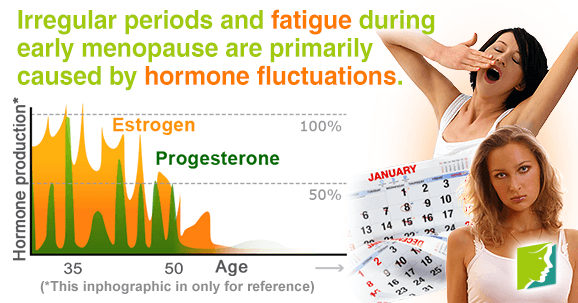Irregular periods are defined as any ongoing changes in a woman's typical menstrual cycle. They can include abnormal bleeding and too frequent or missed periods. While irregular periods are usually one of the first signs a woman is approaching menopause, they can occur at any time in a woman's life. They are directly linked to hormone fluctuations.
Fatigue is one of the most frequently reported symptoms of early menopause, and affects as many as 80% of women at some point in their lives. Fatigue during early menopause is also typically caused by hormone fluctuations, but can also be triggered by lifestyle factors.
Causes of Irregular Periods
The menstrual cycle is completely dependent on hormones, so when hormones fluctuate (specifically estrogen and progesterone), irregular periods often occur. Estrogen is responsible for the thickening of the uterine lining before ovulation. Progesterone is responsible for initiating ovulation. Thus, when these hormone levels fluctuate, irregular bleeding occurs. Every woman's body is different, but a “regular period” is generally defined as one with an interval of 25 - 31 days, with approximately five days of bleeding. However, any noticeable change to your usual pattern can be considered an “irregular period”.
Causes of Fatigue
Fatigue is primarily caused by fluctuations of estrogen and progesterone. Estrogen and progesterone are connected to feeling tired and to deep sleep. Estrogen helps maintain sleep-wake cycles, which are vital for the body to regenerate. Progesterone affects the part of the brain that makes the body feel sleepy. Consequently, when these hormone levels decrease, women have a harder time falling asleep or staying asleep. There are several lifestyle triggers that also cause fatigue, which include stress, poor diet, and lack of exercise, and inadequate sleep.
Treatment Options
Making simple lifestyle changes be very beneficial when managing irregular periods and fatigue during early menopause. Exercising regularly (at least three times a week) has been shown to significantly increase energy, reduce stress, and improve efficiency of the heart, muscles, and joints.
It is also crucial to maintain a healthy and balanced diet in order to prevent fatigue and reduce irregular periods. Including plenty of fruits, vegetables, protein, and whole grains can help keep you healthy and alert. Getting proper amounts of sleep and reducing stress are also key factors in feeling your best and managing menopausal symptoms. The average adult needs around eight hours of sleep per night. Helpful stress-relieving activities include practicing yoga and meditation.
Irregular periods and fatigue are common symptoms most women experience during early menopause. Fatigue affects around 80% of women on a daily basis, and most women experience irregular periods when under high stress. The main cause of these two symptoms is hormonal fluctuations, so it's important to try and restore balance. Exercising regularly, maintaining a healthy diet, and getting plenty of sleep are beneficial ways to help prevent fatigue and irregular periods during early menopause.
Sources
- Better Health Channel. (2011). Fatigue fighting tips. Retrieved August 13, 2014, from http://www.betterhealth.vic.gov.au/bhcv2/bhcarticles.nsf/pages/Fatigue_fighting_tips
- National Institutes of Health. (2014). Fatigue. Retrieved August 13, 2014, from http://www.nlm.nih.gov/medlineplus/fatigue.html
- Office on Women's Health. (2010). Menstruation, menopause, and mental health. Retrieved August 13, 2014, from http://www.womenshealth.gov/mental-health/menstruation-menopause/



.jpg)